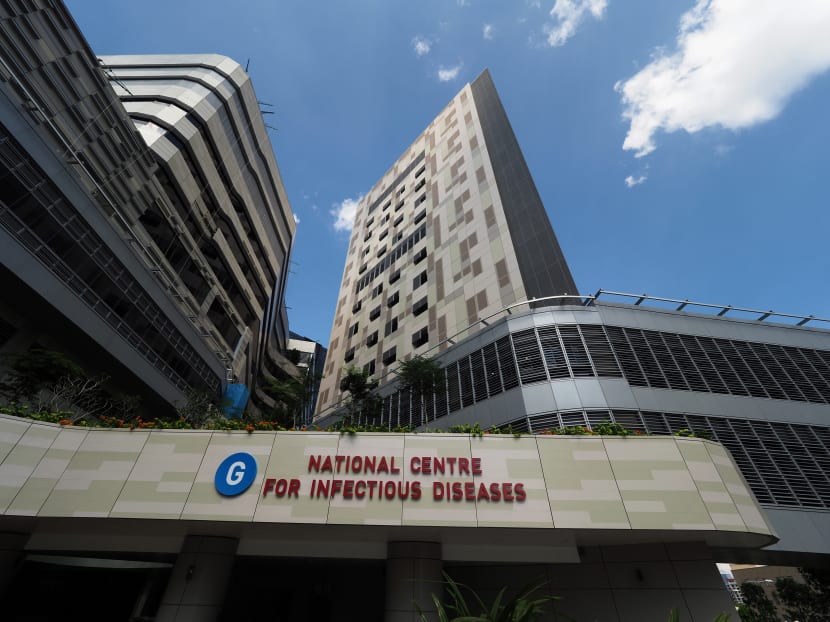First imported case of monkeypox in Singapore: MOH
SINGAPORE — The Ministry of Health (MOH) confirmed on Thursday (May 9) the first imported case of monkeypox infection in Singapore.
SINGAPORE — The Ministry of Health (MOH) confirmed on Thursday (May 9) the first imported case of monkeypox infection in Singapore.
The patient, a 38-year-old Nigerian, travelled alone to Singapore on April 28 and tested positive for monkeypox on Wednesday.
He is currently warded in an isolation ward at the National Centre for Infectious Diseases (NCID) and his condition is stable, said the MOH.
Monkeypox is a rare disease caused by a virus and is primarily transmitted to humans from animals.
Individuals who are infected would typically experience fever, headache, muscle ache, backache, swollen lymph nodes and skin rash.
In a press statement issued by MOH, NCID executive director Leo Yee Sin said the risk of community spread of monkeypox within Singapore is low. “There is no evidence to date that human-to-human transmission alone can sustain monkeypox infections in the human population,” said Prof Leo.
On average, each infected person transmits the infection to less than one other person. “This is much less infectious than the common flu,” Prof Leo added. “The chain of transmission can also be broken through contact tracing and quarantine of close contacts.”
The disease is usually self-limiting, and most patients recover from monkeypox within two to three weeks. In some cases, the virus can cause serious complications such as pneumonia, sepsis, encephalitis (brain inflammation) and eye infection resulting in loss of vision.
The mortality rates of monkeypox have been reported to be between 1 and 10 per cent during outbreaks, with most death occurring in younger patients.
CONTACT TRACING UNDERWAY
The MOH said that the patient stayed at a hotel in 21 Lorong 8 Geylang from April 28 and attended a workshop at 3 Church Street on April 29 and 30.
He then developed fever, muscle ache, chills and skin rash and remained in his hotel room most of the time between May 1 and 7. He was conveyed to Tan Tock Seng Hospital by ambulance on May 7 and transferred to the centre on the same day.
“The patient reported that prior to his arrival in Singapore, he had attended a wedding in Nigeria, where he may have consumed bush meat, which could be a source of transmission of monkeypox virus,” said the MOH.
Based on MOH’s investigations and contact tracing, 23 individuals have been identified as close contacts of the patient, including 18 participants and trainers who attended the same workshop, a staff member at the workshop venue and four hotel staff.
Investigation and contact tracing operations are ongoing, said the ministry.
“Close contacts of the patient have been assessed by NCID and offered vaccination, which can prevent the disease or reduce the severity of symptoms. As a precautionary measure, they will be quarantined and monitored for 21 days from their date of exposure to the patient,” said the MOH.
Those who develop symptoms will be treated at NCID and all other contacts who have a low risk of being infected have been put under active surveillance and will be contacted twice daily to monitor their health status.
A workshop participant had left Singapore on May 5 before the patient was seen and diagnosed at the hospital. This workshop participant has reported to MOH that he is well and MOH has informed the public health authority in his home country as a precaution.
WHAT YOU NEED TO KNOW ABOUT MONKEYPOX
Transmission of monkeypox usually occurs when a person comes in close contact with infected animals — typically rodents — through the hunting and consumption of bush meat.
Human-to-human transmission is limited and an infected individual is only infectious during the period when he or she displays symptoms, in particular skin rash.
Since 1970, human cases of monkeypox have been reported in 10 African countries – Democratic Republic of the Congo, Republic of the Congo, Cameroon, Central African Republic, Nigeria, Ivory Coast, Liberia, Sierra Leone, Gabon and South Sudan. In 2017, Nigeria experienced the largest documented outbreak, about 40 years after it had last confirmed cases of the virus.
In 2003, monkeypox cases were confirmed in the United States in what was the first reported occurrence of the disease outside of the African continent. Most of the patients then were reported to have had close contact with pet prairie dogs that were infected by African rodents that had been imported into the country.
In 2018, three cases of monkeypox were reported in the United Kingdom and one case was reported in Israel.
PUBLIC ADVISORY
The MOH has advised those travelling affected by monkeypox in Central and Western Africa to take precautions, including:
Maintaining a high standard of personal hygiene, including frequent hand washing after going to the toilet, or when hands are soiled.
Avoiding direct contact with skin lesions of infected living or dead persons or animals, as well as objects that may have become contaminated with infectious fluids, such as soiled clothing or linens (bedding or towels) used by an infected person.
Avoid contact with wild animals and consumption of bush meat.
Returning travellers from areas affected by monkeypox should seek immediate medical attention if they develop any disease symptoms within three weeks, such as sudden onset of high fever, swollen lymph nodes and rash










